
Night Monster is a 1942 American black-and-white horror film featuring Bela Lugosi and produced and distributed by Universal Pictures Company. The movie uses an original story and screenplay by Clarence Upson Young and was produced and directed by Ford Beebe. For box office value, star billing was given to Bela Lugosi and Lionel Atwill, but the lead roles were played by Ralph Morgan, Irene Hervey and Don Porter, with Atwill in a character role as a pompous doctor who becomes a victim to the title character, and Lugosi in a small part as a butler.
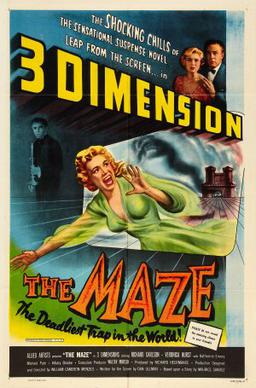
The Maze is a 1953 3-D horror film starring Richard Carlson, Veronica Hurst and Hillary Brooke. It was directed by William Cameron Menzies and distributed by Allied Artists Pictures. It was to be the second 3-D film designed and directed by William Cameron Menzies, known for his very "dimensional" style. It was his final film as production designer and director.

It's Alive is a 1974 American science fiction horror film written, produced, and directed by Larry Cohen. It stars John P. Ryan and Sharon Farrell as a couple whose infant child turns out to be a vicious mutant. The film's cast also includes James Dixon, William Wellman Jr., Shamus Locke, Andrew Duggan, Guy Stockwell, and Michael Ansara. The baby was designed and created by special effects make-up artist Rick Baker, and the film's score was composed by Bernard Herrmann.

The Beast Within is a 1982 American horror film directed by Philippe Mora and starring Ronny Cox, Bibi Besch, Paul Clemens, L. Q. Jones, Don Gordon, R. G. Armstrong, Logan Ramsey, Katherine Moffat, and Meshach Taylor.

The Flesh Eaters is a 1964 American horror/science fiction thriller, directed on a low budget by Jack Curtis and edited by future filmmaker Radley Metzger. The film contains moments of violence much more graphic and extreme than many other movies of its time, making it one of the first ever gore films.

Motel Hell is a 1980 American comedy horror film directed by Kevin Connor and starring Rory Calhoun, Nancy Parsons, and Nina Axelrod. The plot follows farmer, butcher, motel manager, and meat entrepreneur Vincent Smith, who traps travelers and harvests them for his human sausages.

Equinox is a 1970 American supernatural horror film directed by Jack Woods, and starring Edward Connell, Barbara Hewitt, Frank Bonner and Robin Christopher. Though uncredited, producer Dennis Muren also served as a second director. The film focuses on four young people picnicking in a California canyon, where they stumble upon an ancient book used to conjure demons; soon they unleash a plethora of evil creatures.
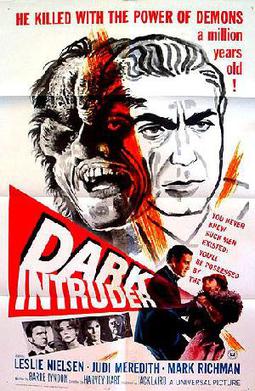
Dark Intruder is a 1965 horror TV movie that was released theatrically, and starring Leslie Nielsen, Mark Richman and Judi Meredith. The film is set in San Francisco in 1890 concerning playboy sleuth and occult expert Brett Kingsford. This atmospheric black-and-white film, only 59 minutes long, was directed by Harvey Hart and was the pilot for a failed television series called The Black Cloak. It was written by Barré Lyndon.
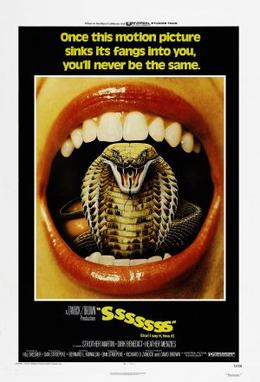
Sssssss is a 1973 American body horror film directed by Bernard L. Kowalski and starring Strother Martin, Dirk Benedict, and Heather Menzies. Its plot follows a college student who becomes a laboratory assistant to a herpetologist who is covertly developing a serum that can transform human beings into snakes.

Madhouse is a 1974 horror film directed by Jim Clark for Amicus Productions in association with American International Pictures. The film, which is a British-American co-production, stars Vincent Price, Natasha Pyne, Peter Cushing, Robert Quarry, Adrienne Corri, and Linda Hayden. The film was based on the 1969 novel Devilday by Angus Hall.

First Man into Space is a 1959 independently made British-American black-and-white science fiction-horror film directed by Robert Day and starring Marshall Thompson, Marla Landi, Bill Edwards, and Robert Ayres. It was produced by John Croydon, Charles F. Vetter, and Richard Gordon for Amalgamated Films and was distributed by Metro-Goldwyn-Mayer.

The She-Creature, or The She Creature, is a 1956 American black-and-white science fiction horror film, released by American International Pictures from a script by Lou Rusoff. It was produced by Alex Gordon, directed by Edward L. Cahn, and stars Chester Morris, Marla English and Tom Conway, and casting Frieda Inescort and El Brendel in smaller roles. The producers hired Marla English because they thought she bore a strong resemblance to Elizabeth Taylor.
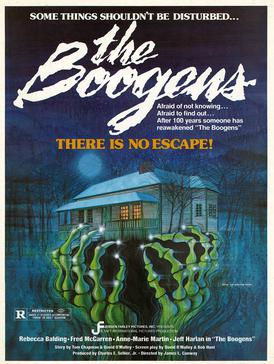
The Boogens is a 1981 American monster film directed by James L. Conway and starring Rebecca Balding, Fred McCarren, Anne-Marie Martin, Jeff Harlan, John Crawford, Med Flory, Jon Lormer, and Scott Wilkinson. The title refers to scaly turtle-like monsters that are released from an abandoned and boarded-up silver mine, and begin to wreak havoc.

The Baby is a 1973 American psychological horror film directed by Ted Post and written by Abe Polsky. The film stars Anjanette Comer, Ruth Roman, Marianna Hill, Suzanne Zenor, and David Manzy. It tells the story of a social worker who investigates an eccentric family which includes "Baby", a 21-year-old man who acts like an infant. The film is considered a cult classic.

Singapore is a 1947 American film noir crime romance film starring Fred MacMurray, Ava Gardner, and Roland Culver. Directed by John Brahm, the film was remade as Istanbul (1957) with the location moved to Turkey, and Errol Flynn and Cornell Borchers in the starring roles.

The Premonition is a 1976 American psychological horror film produced and directed by Robert Allen Schnitzer, and starring Richard Lynch, Sharon Farrell, Danielle Brisebois, and Jeff Corey. Its plot follows a foster mother who enlists the help of a parapsychologist after her foster daughter is stalked by her mentally-unhinged biological mother and her circus clown boyfriend.

House of the Damned is a 1963 horror thriller film, shot in CinemaScope. It was produced and directed by Maury Dexter, and stars Ron Foster, Merry Anders, Richard Crane, Erika Peters and Richard Kiel.
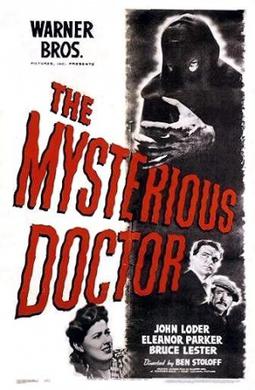
The Mysterious Doctor is a 1943 American horror film directed by Benjamin Stoloff and written by Richard Weil. The film stars John Loder, Eleanor Parker, Bruce Lester, Lester Matthews and Forrester Harvey. The film was released by Warner Bros. on March 3, 1943.

Krampus Unleashed is a 2016 horror film written and directed by Robert Conway. Premiering on video on demand before being released direct-to-video, the film stars Bryson Holl, Caroline Lassetter, Tim Sauer, and Emily Lynne Aiken as members of a dysfunctional family who run afoul of the mythological creature Krampus while spending Christmas with relatives in the Southwestern United States.

The Golem is a 2018 Israeli period supernatural horror film directed by Doron and Yoav Paz, and written by Ariel Cohen. It stars Hani Furstenberg, Ishai Golan, Brynie Furstenberg, and Konstantin Anikienko. The Golem is based on the Jewish legend of the same name, and the film's creators felt that the legend, which they referred to as "the Jewish Frankenstein", had never been properly developed into a film since the 1951 version The Emperor and the Golem. Originally it was intended to retain the original appearance of the title character for the film, "In the beginning, when we just started on the idea for the movie, we tried to tell the story as it is. That is with the real giant creature made of mud and clay,". The idea was soon abandoned, however, after realizing that it would not fit with the story they wanted to convey, deciding instead to reimagine the classic tale for a more contemporary audience while staying true to its original themes. Principal photography for The Golem commenced in the summer of 2017 near Kyiv, Ukraine, for a month and a half, with the majority of the film was shot in an isolated outdoor set, "in the middle of nowhere".




















